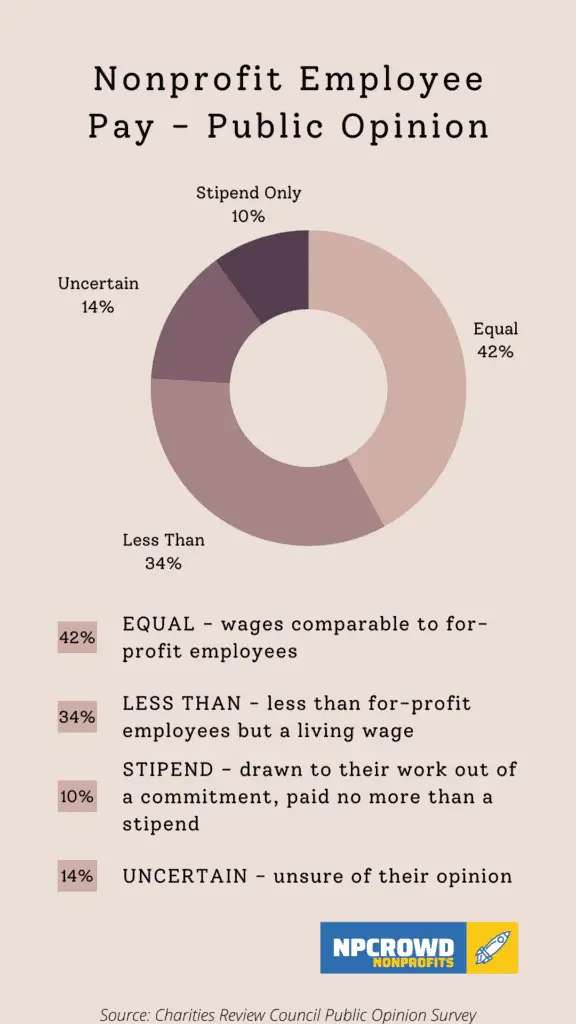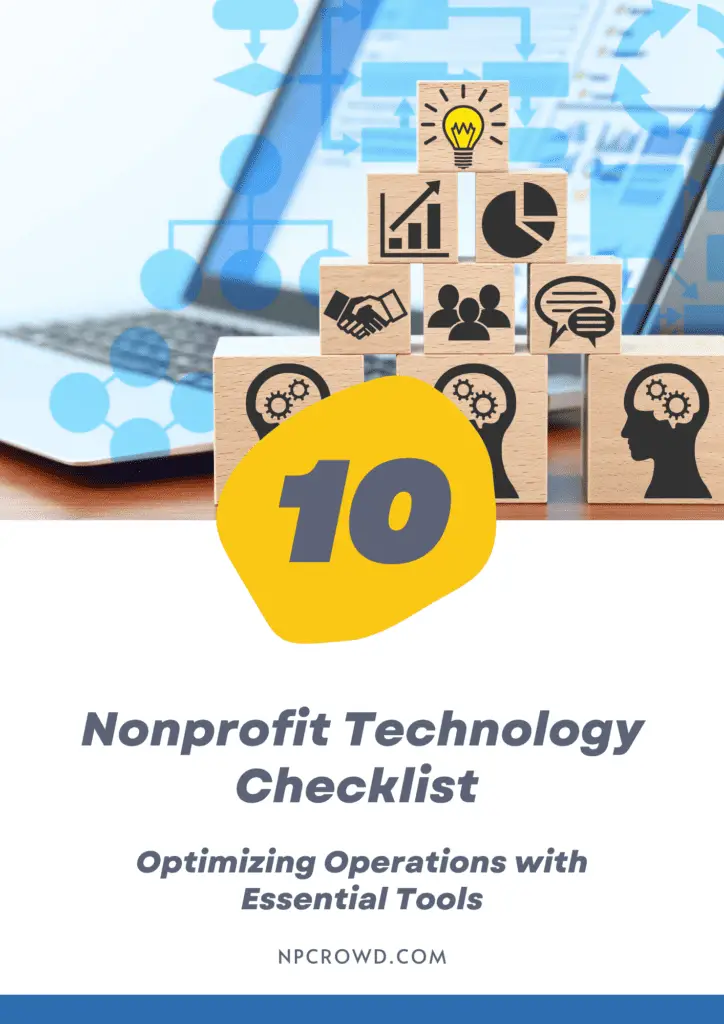How Much Do Nonprofits Pay Employees
Disclaimer: This post may contain affiliate links. These links, if used and purchases made, we may earn a small commission. These affiliate programs do not impact the recommendations we make or the resources we refer you to. Our focus is on providing you the best resources for your nonprofit journey.
Many people don’t realize that there are viable, paid careers in the nonprofit sector. In fact, you may be surprised at how much of a living wage some nonprofits provide for solid, mission-driven professionals with skills ready to deploy.We’ve collected data from Zip Recruiter, Indeed, ADP, and personal data sources to bring you some high-level salary information for U.S based nonprofits across all 50 states.
Let’s check out nonprofit salaries from our analysis.
How Much Do Nonprofit Employees Make?
In the United States, the current data shows that nonprofit employees across all levels average a salary of $48,688 per year while hourly employees average $23 per hour. The average minimum salary across all states is $25,544 and the average maximum is $108,885. The majority of nonprofit positions in the United States pay between $36,936 and $52,627. The state with the highest average is Washington at $57,182 and the lowest is North Carolina at $43,119.
Video Answers
What Are The Best Paying Nonprofit Jobs?
Just like in for-profit businesses, the higher up the ranks a position is, typically the higher the commensurate pay will be. Nonprofits are very similar with Presidents, CEOs, and Executive Directors earning the most. The national average annual salary for these roles is $101,381.
The top 5 best-paying nonprofit jobs are:
- President/CEO – $101,381
- Nonprofit Controller – $92,307
- Nonprofit Health – $92,199
- Nonprofit Data Science – $91,097
- Compliance Officer – $89,945
From personal experience and knowledge, I can tell you there are other positions that pay very well. Some other nonprofit job salaries from a personal dataset include:
- Director of Technology – $94,768
- Vice President – Operations – $115,340
- Vice President – Marketing/Communications – $94,229
- Director of Advancement – $91,762 + Bonus structure
Do Certain Professions Get Paid More At A Nonprofit?
Yes, there are certain common nonprofit job titles and professions that typically get paid more than others in a nonprofit. Generally, executive leadership, financial leaders (CFO, Controller), technology, and data science roles can receive premium pay.
For specific types of nonprofits, other skills and professions may be in high demand. Medical professionals may be some of the most highly paid employees in the medical services nonprofit. Top-tier fund-raisers might receive top pay when bonus structures are included in the mix.
Interestingly enough, program staff may not be the most highly-compensated roles yet they are the front-line staff performing the boots on the groundwork.
Just like in the for-profit world, pay increases with specialized knowledge, increased responsibility and accountability, and management span.
Does a nonprofit’s size affect the pay?
In short, yes, a nonprofit’s total asset valuation does typically impact the salary ranges for paid positions.
The IRS classifies 501(c)3 nonprofits by their total assets. The classifications are:
- Under $100,000
- $100,000 under $500,000
- $500,000 under $1,000,000
- $1,000,000 under $10,000,000
- $10,000,000 under $50,000,000
- $50,000,000 or more
In general, the salaries available for nonprofit jobs will increase as the total assets classification increases.
For example, a nonprofit under $100,000 likely has a volunteer President/CEO with no paid staff. Another nonprofit with total assets of $2 million might pay $130,000/year for the President/CEO while a $40 million nonprofit might pay its President/CEO north of $250,000/year.
How Much Of A Nonprofit’s Budget Should Be Allocated To Salaries?
According to an analysis of IRS Form 990 statistics for 209,755 nonprofits, 87% of funding was spent on program expenses, 12% on Management and general expenses, and 1% on fundraising.
The Better Business Bureau Standards for Charity Accountability state that nonprofits should spend at least 65% of their total expenses on program activities and no more than 35% of related contributions on fundraising.
Salaries will typically be a significant part of program expenses as well as administrative (management/other) expenses.
Depending on the type of nonprofit and how it provides its program services, it may not be unreasonable to spend 50%-60% of its budget on wages and salaries.

Is There A Cap On Nonprofit Executive Salaries?
No, there is no legal requirement to keep a nonprofit executive’s salary below a specific threshold. However, it is necessary to be sure the compensation is commensurate with the role, organization size, and in comparison with the marketplace.
In fact, employees who make over $100,000 per year will need to be reported by name and salary on the Form 990 filing with the IRS. Those who earn over $150,000 per year are identified as key employees and may also be publicly named along with their salary on Form 990.
A nonprofit’s Form 990 is public data and available to anyone.
Nonprofit Salary Data By State [Table]
We collated and reviewed a number of data sources to compile the data table below. As we get updated data, we will update the table and label it with the most recent updated date.
| Nonprofit State | Nonprofit Employee Avg. Salary | Nonprofit Employee Avg. Hourly | Nonprofit Employee Minimum Salary | Nonprofit Employee Maximum Salary | Nonprofit Employee Salary 25th Percentile | Nonprofit Employee Salary 75th Percentile |
|---|---|---|---|---|---|---|
| Alabama | $43,924 | $21 | $23,635 | $100,667 | $34,139 | $46,831 |
| Alaska | $48,133 | $23 | $26,922 | $114,669 | $38,887 | $53,346 |
| Arizona | $49,803 | $24 | $25,087 | $106,851 | $36,236 | $54,818 |
| Arkansas | $49,820 | $24 | $23,793 | $101,342 | $34,368 | $49,820 |
| California | $51,483 | $25 | $26,544 | $113,057 | $38,341 | $58,002 |
| Colorado | $45,950 | $25 | $24,366 | $108,041 | $36,639 | $52,805 |
| Connecticut | $48,977 | $24 | $27,178 | $115,758 | $39,257 | $53,853 |
| Delaware | $50,425 | $24 | $25,400 | $108,186 | $36,689 | $55,503 |
| Florida | $42,390 | $20 | $22,810 | $97,153 | $32,947 | $45,197 |
| Georgia | $44,975 | $22 | $24,201 | $103,079 | $34,957 | $47,953 |
| Hawaii | $50,476 | $24 | $28,175 | $120,003 | $40,696 | $55,827 |
| Idaho | $48,262 | $23 | $24,816 | $105,697 | $35,845 | $54,227 |
| Illinois | $49,551 | $24 | $23,664 | $100,790 | $34,181 | $51,709 |
| Indiana | $46,324 | $22 | $24,926 | $106,167 | $36,004 | $49,390 |
| Iowa | $44,281 | $21 | $24,442 | $104,106 | $35,305 | $48,432 |
| Kansas | $44,866 | $22 | $24,979 | $106,390 | $36,080 | $49,494 |
| Kentucky | $51,090 | $25 | $24,187 | $103,018 | $34,936 | $52,852 |
| Louisiana | $44,911 | $22 | $24,697 | $105,190 | $35,672 | $48,935 |
| Maine | $49,228 | $24 | $24,797 | $105,618 | $35,818 | $54,186 |
| Maryland | $55,688 | $27 | $27,187 | $115,795 | $39,269 | $59,407 |
| Massachusetts | $62,457 | $30 | $29,335 | $124,947 | $42,373 | $64,102 |
| Michigan | $49,495 | $24 | $23,811 | $101,418 | $34,393 | $52,030 |
| Minnesota | $46,309 | $22 | $25,465 | $108,464 | $36,783 | $50,458 |
| Mississippi | $42,028 | $20 | $23,396 | $99,648 | $33,793 | $46,357 |
| Missouri | $52,078 | $25 | $25,236 | $107,487 | $36,452 | $55,145 |
| Montana | $47,107 | $23 | $25,348 | $107,963 | $36,613 | $50,225 |
| Nebraska | $54,603 | $26 | $26,777 | $114,049 | $38,677 | $58,511 |
| Nevada | $47,754 | $23 | $26,711 | $113,769 | $38,582 | $52,927 |
| New Hampshire | $53,539 | $26 | $28,550 | $121,602 | $41,239 | $56,571 |
| New Jersey | $47,357 | $23 | $25,777 | $109,792 | $37,233 | $51,076 |
| New Mexico | $43,670 | $21 | $23,871 | $101,674 | $34,480 | $47,300 |
| New York | $55,391 | $27 | $29,615 | $126,140 | $42,777 | $58,682 |
| North Carolina | $43,119 | $21 | $21,720 | $92,512 | $31,373 | $47,461 |
| North Dakota | $47,695 | $23 | $26,610 | $113,338 | $38,436 | $52,727 |
| Ohio | $45,901 | $22 | $25,199 | $107,329 | $36,398 | $49,931 |
| Oklahoma | $50,748 | $24 | $24,887 | $105,997 | $35,947 | $54,381 |
| Oregon | $45,571 | $22 | $25,404 | $108,200 | $36,693 | $50,336 |
| Pennsylvania | $47,328 | $23 | $25,310 | $107,801 | $36,558 | $50,150 |
| Rhode Island | $48,358 | $23 | $26,957 | $114,817 | $38,938 | $53,415 |
| South Carolina | $52,729 | $25 | $25,488 | $108,562 | $36,816 | $55,696 |
| South Dakota | $46,301 | $22 | $25,833 | $110,029 | $37,314 | $51,187 |
| Tennessee | $46,236 | $22 | $25,382 | $108,110 | $36,663 | $50,294 |
| Texas | $47,493 | $23 | $23,923 | $101,896 | $34,555 | $52,276 |
| Utah | $45,355 | $22 | $24,968 | $106,342 | $36,064 | $49,472 |
| Vermont | $50,432 | $24 | $26,811 | $114,194 | $38,726 | $53,124 |
| Virginia | $53,886 | $26 | $26,426 | $112,553 | $38,170 | $57,744 |
| Washington | $57,182 | $27 | $29,131 | $124,076 | $42,077 | $63,655 |
| West Virginia | $48,143 | $23 | $25,746 | $109,658 | $37,188 | $51,014 |
| Wisconsin | $45,970 | $22 | $25,139 | $107,073 | $36,312 | $49,812 |
| Wyoming | $49,600 | $24 | $26,587 | $113,241 | $38,403 | $52,681 |
| U.S. Average | $48,688 | $23 | $25,544 | $108,885 | $36,926 | $52,627 |
Related Questions
How much do founders of nonprofits make? Assuming the founder is the Executive Director or President of the nonprofit, the founder’s average an annual salary of $147,241. The type and size of the nonprofit does influence the founder’s pay.
Do nonprofits give bonuses? Yes, some nonprofits do give bonuses to some or all employees. For example, a nonprofit may give fundraising employees bonuses based on their ability to achieve or exceed fundraising goals. Just remember that nonprofits are to report bonuses of all types and any compensation incentives, on Form 990, Schedule J.
Do nonprofit employees pay federal taxes? Yes, while nonprofits have their own tax exemptions, employees are subject to the same payroll taxes as for-profits including federal income tax and FICA withholdings. Nonprofits are still responsible for the employer’s share of FICA withholdings.
Do nonprofit employees pay Social Security? According to the Social Security Administration (SSA): Nonprofit organizations may not be required to pay federal taxes. However, employees of a nonprofit organization must pay Social Security taxes on their earnings of $108.28 or greater. This is similar to self-employed individuals. For 2021 this rate was 15.3%. Remember that there are special tax credits you may be able to take when you file your tax return.




![21+ Nonprofit Management Certificate Programs: Best List 5 21+ Nonprofit Management Certificate Programs [Best List]](https://npcrowd.com/wp-content/uploads/2021/08/Nonprofit-Management-Certificate-Programs-Best-List-768x402.jpg)


